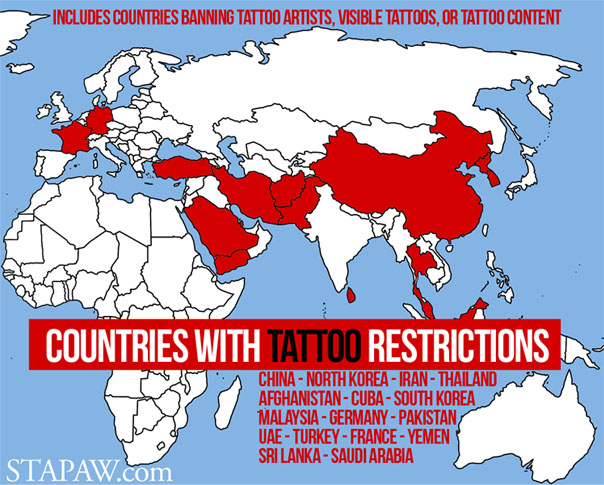As tattoos become more mainstream globally, they still remain a point of controversy in several regions. Many people embrace tattoos as a form of self-expression or to showcase cultural heritage. However, some countries have implemented strict regulations or outright tattoo bans due to religious doctrines, political concerns, or deep-rooted cultural practices. Whether you’re traveling or simply curious about global tattoo norms, understanding the countries where tattoos are illegal can help avoid unexpected consequences or cultural misunderstandings.
Countries That Ban Tattoos or Restrict Them Heavily
Here is a list of countries where tattoos are illegal or heavily restricted:
| Country | Reason for Ban/Restriction |
|---|---|
| Iran | Tattoos are considered un-Islamic, with religious authorities seeing them as Western influences. |
| North Korea | Tattoos are restricted to political or ideological messages that support the regime. |
| South Korea | Only licensed medical professionals can legally perform tattoos, as tattoos are seen as medical procedures. |
| Sri Lanka | Religious tattoos, especially those depicting Buddha, are banned to prevent disrespect to local religious beliefs. |
| Thailand | Tattooing religious symbols like Buddha is restricted to prevent misuse or cultural offense. |
| Vietnam | Tattoos are linked to criminal activity and gang affiliations, creating a negative perception. |
| Japan | Tattoos are heavily associated with the yakuza, causing social stigma despite legal allowances. |
| Denmark | Visible tattoos on the hands, face, or neck are restricted due to their association with rebellious groups. |
| Saudi Arabia | Tattoos are seen as haram (forbidden) under Islamic law, being considered acts of vanity. |
| Germany | Nazi-related tattoos are illegal, as they represent symbols of hate and political extremism. |

Image source – https://www.stapaw.com/single-post/2016/12/23/shocking-tattoo-laws-in-countries-that-limit-or-ban-tattoos
Religious Views on Tattoos and Cultural Sensitivity
In many countries, religious views on tattoos shape their legality. In Islamic countries like Iran and Saudi Arabia, tattoos are considered haram, meaning forbidden, according to Islamic law. Tattoo legality in Islamic countries is deeply rooted in cultural and religious interpretations, which consider tattoos an act of defilement or vanity. Meanwhile, in Buddhist countries like Thailand, tattoos of religious icons may be banned or restricted to prevent cultural offense.
In regions where tattoo bans are in place due to religion, it’s important to respect local beliefs. Travelers with tattoos featuring religious symbols should be especially cautious, as these images may be perceived as offensive or inappropriate.
You can also read our article about if Can You Get a Tattoo at 16 in the USA?
Consequences of Illegal Tattoos
Getting or displaying a tattoo in a country with tattoo bans can lead to serious consequences. In Iran and Saudi Arabia, authorities may impose fines or even jail time on those who violate tattoo laws. These countries also treat tattoo removal as a form of repentance for those who have violated religious principles. In North Korea, tattoos that criticize or mock the regime can result in severe punishment. Illegal tattoo consequences can range from financial penalties to criminal charges, depending on the country’s laws. In nations where tattoo licensing requirements exist, unlicensed tattooing could lead to closure of businesses or revocation of medical licenses.

Image source – https://giphy.com/gifs/laff-tv-illegal-not-allowed-thats-L7zmmuaEo50MCt1Y7o
Cultural Significance of Tattoos in Restricted Countries
In some countries, tattoos hold negative cultural connotations. For example, in Vietnam, tattoos are often associated with gangs or criminal behavior. In Denmark, tattoo regulations restrict certain areas of the body, like hands and faces, due to their historical connection with rebellious subcultures. Understanding the cultural significance of tattoos in each country is key for travelers, especially those with visible tattoos.
On the other hand, in countries like Japan, tattoos are heavily linked to the yakuza, a notorious crime syndicate, which is why many businesses, especially spas and resorts, ban customers with visible tattoos. Though the tattoo legality in Japan has relaxed over time, cultural perceptions remain strong, and tattooed individuals often face social stigma.
What to Consider When Traveling with Tattoos
If you’re traveling to a country where tattoos are illegal or restricted, there are several precautions you should take. First, research tattoo legality in your destination to avoid any legal trouble. Always dress modestly to cover any visible tattoos, particularly if they feature religious symbols that could be misinterpreted.
Countries that ban tattoos often have strict enforcement, so it’s wise to familiarize yourself with local customs and tattoo laws. It’s also crucial to consider the impact of your tattoo’s design; for instance, political tattoos in North Korea or religious tattoos in Islamic countries could be more problematic than a generic design.
By respecting tattoo bans and local cultures, travelers can avoid legal complications and show cultural awareness during their trips.





